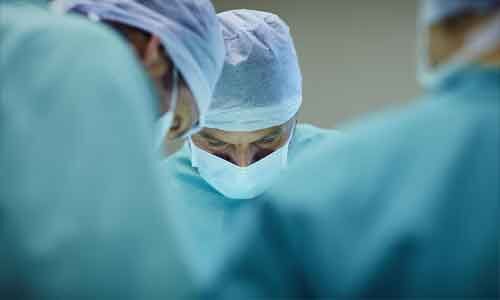- Home
- Medical news & Guidelines
- Anesthesiology
- Cardiology and CTVS
- Critical Care
- Dentistry
- Dermatology
- Diabetes and Endocrinology
- ENT
- Gastroenterology
- Medicine
- Nephrology
- Neurology
- Obstretics-Gynaecology
- Oncology
- Ophthalmology
- Orthopaedics
- Pediatrics-Neonatology
- Psychiatry
- Pulmonology
- Radiology
- Surgery
- Urology
- Laboratory Medicine
- Diet
- Nursing
- Paramedical
- Physiotherapy
- Health news
- Fact Check
- Bone Health Fact Check
- Brain Health Fact Check
- Cancer Related Fact Check
- Child Care Fact Check
- Dental and oral health fact check
- Diabetes and metabolic health fact check
- Diet and Nutrition Fact Check
- Eye and ENT Care Fact Check
- Fitness fact check
- Gut health fact check
- Heart health fact check
- Kidney health fact check
- Medical education fact check
- Men's health fact check
- Respiratory fact check
- Skin and hair care fact check
- Vaccine and Immunization fact check
- Women's health fact check
- AYUSH
- State News
- Andaman and Nicobar Islands
- Andhra Pradesh
- Arunachal Pradesh
- Assam
- Bihar
- Chandigarh
- Chattisgarh
- Dadra and Nagar Haveli
- Daman and Diu
- Delhi
- Goa
- Gujarat
- Haryana
- Himachal Pradesh
- Jammu & Kashmir
- Jharkhand
- Karnataka
- Kerala
- Ladakh
- Lakshadweep
- Madhya Pradesh
- Maharashtra
- Manipur
- Meghalaya
- Mizoram
- Nagaland
- Odisha
- Puducherry
- Punjab
- Rajasthan
- Sikkim
- Tamil Nadu
- Telangana
- Tripura
- Uttar Pradesh
- Uttrakhand
- West Bengal
- Medical Education
- Industry
No significant risk of new diabetes onset after pancreatectomy for PCLs: ACG 2020

Columbus, OH: The risk of new onset diabetes mellitus (NODM) after partial pancreatectomy for pancreatic cystic lesions (PCLs) is not excessive and is relatively higher in older patients with features of cardiovascular disease and/or metabolic syndrome.
The findings of the study were presented at the ACG 2020 Virtual Annual Scientific Meeting.
People undergoing pancreatic resection have a risk of developing post-operative NODM. Patients with PCLs generally have normal adjacent pancreatic parenchyma compared with patients who undergo surgery for other indications including pancreatic adenocarcinoma, and acute and chronic pancreatitis. However, postoperative diabetes risk among PCLs patients is poorly defined. Therefore, the objective of the study by Stephen Firkins, The Ohio State University Wexner Medical Center, Columbus, OH, and colleagues, was to characterize the risk factors and incidence associated with NODM following pancreatectomy for PCLs.
For the purpose, the researchers utilized the Truven MarketScan Research Database (2012-2018) to identify all adult patients with PCLs and without prevalent DM who underwent a pancreatic resection. Stringent exclusion criteria were utilized to isolate only those patients without other diseases of the exocrine pancreas.
Key findings of the study include:
- Among 311 subjects with PCLs who underwent partial pancreatectomy, the overall risk of post-operative DM was 9.1% at 6 months, 15.1% at 1 year, and 20.2% at 2 years.
- In a multivariable Cox proportional hazards model, older age (55-64 years, adjusted Hazard Ratio (aHR) 1.97 vs. 18-54 years), obesity (aHR 2.63), hypertension (aHR 1.79) and cardiovascular disease/heart failure (aHR 2.54) were independent predictors of post-operative NODM.
- Moreover, there was no significant difference in risk of NODM after distal pancreatectomy versus pancreaticoduodenectomy (unadjusted HR 1.41) in this population.
"The risk of NODM following pancreatectomy for PCL was not excessive, and was relatively higher in older patients with features of metabolic syndrome and/or cardiovascular disease," wrote the authors.
"Individuals with these clinical characteristics may benefit from peri- and post-operative monitoring, education, and treatment strategies for DM," they concluded.
P0127 (S0133). - Incidence and Predictors of New Onset Diabetes Mellitus Following Surgical Resection of Pancreatic Cystic Lesions was presented at the ACG 2020 Virtual Annual Scientific Meeting.
Dr Kamal Kant Kohli-MBBS, DTCD- a chest specialist with more than 30 years of practice and a flair for writing clinical articles, Dr Kamal Kant Kohli joined Medical Dialogues as a Chief Editor of Medical News. Besides writing articles, as an editor, he proofreads and verifies all the medical content published on Medical Dialogues including those coming from journals, studies,medical conferences,guidelines etc. Email: drkohli@medicaldialogues.in. Contact no. 011-43720751


